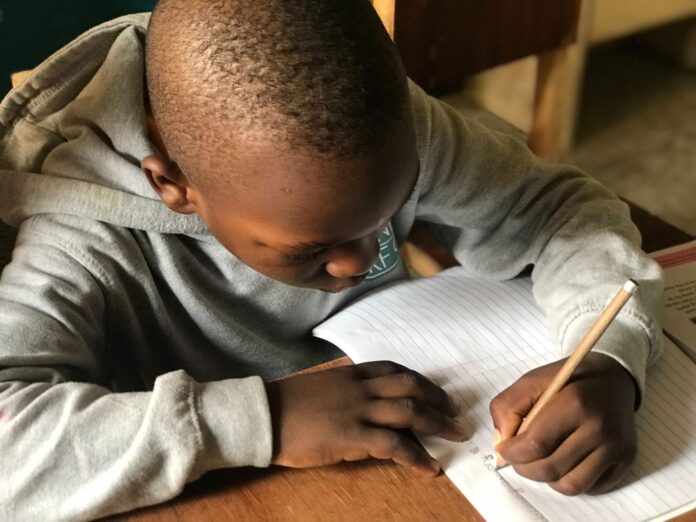
By
They say knowledge increases with age, as does financial literacy and hopefully wealth. But what if children could learn about money as young as 3-years-old?
The results, Ebony Beckford says, could lead to “restored generational wealth.” And to a great extent for Black people.
Beckford, 44, is the founder and CEO of Fin Lit Kids, a company empowering families and educators with tools to teach future generations about the power of money management. Experiences with death, life, and the consequences of bad financial decisions showed her how vital financial literacy is.
In 2020, Beckford wrote and released “Madison’s 1st Dollar,” a children’s book showing the impact of $1 depending on its use. Children explore their options — Madison could spend, save, donate, or invest it.
Over three years, Madison’s universe has expanded with “Madison’s 1st Budget” and two corresponding picture books. Beckford added Coin Flash Cards, a Money Match Card Game, and the popular “Money Box,” a collection of interactive activities to introduce basic financial concepts.
“I feel like I’m right on time because people are starting to recognize that there’s a problem,” she says. “The states are starting to put in mandates for financial literacy, but even with that, they’re starting at the high school or middle school level and not focusing on elementary school, which is where we really need to start instilling those values and developing those habits.”
After nine years at a real estate technology company, Beckford is working as a full-time entrepreneur at Fin Lit Kids to fill the gap between parents’ financial knowledge and the financial education children receive at school.
Beckford’s ‘Money Story’
Beckford’s life story starts in the Bronx in New York City, where she was born and raised, but her money story kicks off after a series of deaths in her family, including two siblings, a grandfather, and her mother in the late 90s. At 18, she was responsible for keeping her remaining family above water. Beckford says she was unprepared and lacked the knowledge to create a financially stable situation.
“I wasn’t able to properly mourn several of my family members because I was immediately in survival mode,” she says. “My nieces and nephews went through struggles that were absolutely unnecessary, and a lot of it was due to lack of education. If I had known little things like investing and what that means earlier in my life, I could have done more to help myself and help my family.”
There is a good chance that financial education earlier in life could have made a difference in Beckford’s life.
Nationwide, financial literacy is lacking among adults and children. Children 10 to 14 scored 57% on average, and more than half of teens 15 to 18 failed the National Financial Literacy Test in 2023, according to the National Financial Educators Council. Since 2017, the median score on the test has stagnated at 65%.
Data from the council shows that scores do increase with age. But waiting for adulthood to learn the inner workings of money is a setback.
“The young have the most to gain from financial education, which is why it should begin early,” wrote Andrea Sticha, Deputy Academic Director at the Global Financial Literacy Excellence Center (GFLEC) at George Washington University School of Business, in a report about financial education at school and work.
“Financial education for students opens the way for them to build financial knowledge that can be applied to the many consequential decisions they face as young adults, including whether to pursue and how to finance a college degree,” Sticha continues.
Beckford became a mother in 2019 with the birth of her daughter, Madison, who inspired her book’s main character. Entering motherhood brought up many concerns for her, like the Black maternal mortality rates, where Black women are three times as likely to die during childbirth. She was also concerned about the financial situation she would leave behind.
“I was also thinking about my personal experiences and the things I had gone through since my mom passed,” she says. “At the core of it all was economics. It was financial issues that caused me to struggle. I wanted to pass on the things that I wish I had known better to my daughter.”
Teaching the Next Generation
While Beckford wants Fin Lit Kids to be the premiere place for children’s financial literacy, being a brand that represents entrepreneurship and dismantles harmful stereotypes about the Black communities’ relationship with money is another priority.
She believes there is universal value in seeing Black characters like Madison, E.J., and Sadie — other characters based on her nephew and niece — learn about managing money.
In addition to her current offerings, Beckford plans to release an album and animated music videos featuring songs about money to the rhythms of popular nursery rhymes. And she works on financial literacy programs and curriculums for nonprofits and school districts.
For years, she saw herself as “just a poor girl from the Bronx.” But there is value in an imperfect money story.
Beckford says parents should “share stories about their finances, stories about their mistakes, and stories about their wins with their kids, so they have the tools to move forward and create real generational wealth which goes beyond just financial assets.”



